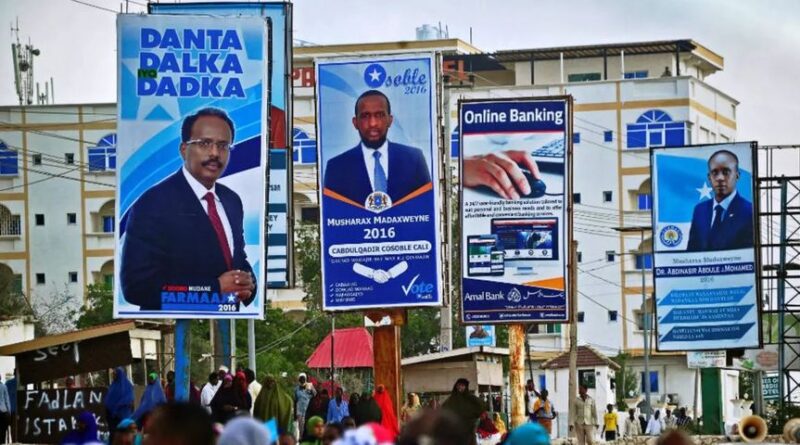Somalia’s problems are much deeper than a failed leader
Mohamed Abdullahi Farmaajo may have promised many things when he became Somalia president on February 8, 2017.
However, the one giving him sleepless nights is failure to deliver universal suffrage.
His constitutional four-year term ended on Monday but the country had not held elections for lawmakers or tested his bid for a second term.
Farmaajo remains in office by virtue of a law passed in September requiring incumbents to stay around until their successors are elected.
He has scheduled another round of meetings with federal state leaders tomorrow in an attempt to find a path on when the elections should be held.
The invitations ran into trouble as some leaders rejected the suggested meeting venue – Garowe in Puntland.
Analysts say Farmaajo may be the wrong tree to bark at. The system he has worked under is to blame, they argue.
“There is no election in Somalia, just selection. But if there is no selection process, everything is uncertain,” Abdiwahab Sheikh Abdisamad, a Horn of Africa analyst, said.
Report card
Farmaajo, who defeated his predecessor Hassan Sheikh Mohamud, promised to destroy the terrorist group Al-Shabaab.
He also pledged to improve the economy, fight corruption, review the constitution and ensure one-person-one-vote elections are held on time.
Farmaajo’s report card indicates he won over lenders, leading to debt relief. The country’s revenue collection has improved, according to Finance Minister Abdirahman Beileh.
“It was an empty promise. Eliminating Al-Shabaab is impossible,” Abdisamad said.
But he added that Somalia’s problems are much deeper, including being an arena for foreign interests.
According to the Panel of Experts on Somalia, the group is raising just about the same amount of money from the public as the government.
This is not the first election in Somalia not held on time. In fact, the past four were delayed as politicians haggled on consensus.
Mistrust
At a forum organised by the Horn International Institute of Strategic Studies, Zakaria Yusuf, a constitutional lawyer, said this is not the case in the current scenario.
“Somalia has been built on consensus between stakeholders and elections have been indirect,” Yusuf said in Nairobi.
He argued that under Farmaajo, certain events such as “rigged” regional elections in South West and Galmudug states have raised suspicion.
“Transition in the past was normal because elections were a result of consensus. Recent events have caused mistrust. There is need to build confidence,” Yusuf, also a researcher and analyst at the International Crisis Group, said.
Whether elections have brought stability or whether stability can lead to fair polls is still debatable.
Local solution
Political analyst Abdi Hashi says Somalis not fighting in the wake of the current crisis is a good sign.
But he adds that the problem may require a localised solution.
“What forms of government are needed in Africa? We need to our own forms, away from those imposed on us by colonialists,” he said.
Part of the crisis in Somalia arose from lack of interpretation of the law.
The Council of Presidential Candidates, an opposition caucus, called for a transitional plan. It even threatened to withdraw Farmaajo’s recognition.
Pressure from the global community made it change the stance. The caucus on Thursday called for urgent dialogue.
Constitutional review
Adam Aw Hirsi, a Somali political analyst, told the Nation that the next government must prioritise a constitutional review.
“The timely review and practical implementation of the Somali Provisional Constitution, including the establishment of a Constitutional Court, will save the country the periodical uncertainties that almost always coincide with national elections,” Aw Hirsi, a former minister, said on Friday, referring to Somalia’s unclear provisions in law.
“Therefore, the next two big tasks for President Farmaajo or his elected successor will be to fast track completion of the judiciary and to restore the social cohesion that was negatively impacted by the prevailing electoral squabbles.”
Somalia has run on a provisional constitution since 2011, providing for a loose parliamentary system but a federal structure.
That law is deemed incomplete because the actual federation is undetermined. Some federal states such as Puntland are deemed stronger and more stable than the federal government, and often veto decisions chosen by Mogadishu.
“Somalia’s problem is not lack of security, as some have often said. It is lack of a constitution,” Abdalla Ibrahim Afuaranle, a Somali political researcher, told the Nation.
“The long-term solution is to implement the federal system as it is. The elections must occur at the same time for all stakeholders to concentrate on their backyards. The problem is that regional states have different dates for election. This allows interference.”
More federal states
There are indications that more federal states will created and that the fate of Benadir, the metropolitan region of Mogadishu, is unfinished.
Recently, Farmaajo signed into law a bill that provided for 13 senators from Benadir to join the new Senate. It raised a storm as some argued the law was never only approved by the Lower House.
With no permanent, independent electoral commission and a weak judiciary with no constitutional court, Somalia operates based on gentlemen’s agreements.
There were indications a committee could be set up to help iron out differences for the Monday meeting.
But analysts think there is too much of a gap when it comes to trust among stakeholders.
“Lack of confidence among the stakeholders and politics of elections is crippling talks among leaders,” said Abdimalik Abdullahi, a Somali researcher.
“Talks should resume regardless of the venue. A broader engagement with stakeholders ,including women, is the ideal approach to boost the legitimacy of the process.”
Some suggested that stakeholders be railroaded to a deal.
amutambo@ke.nationmedia.

